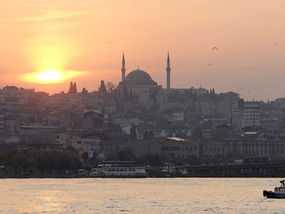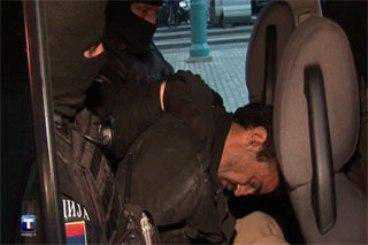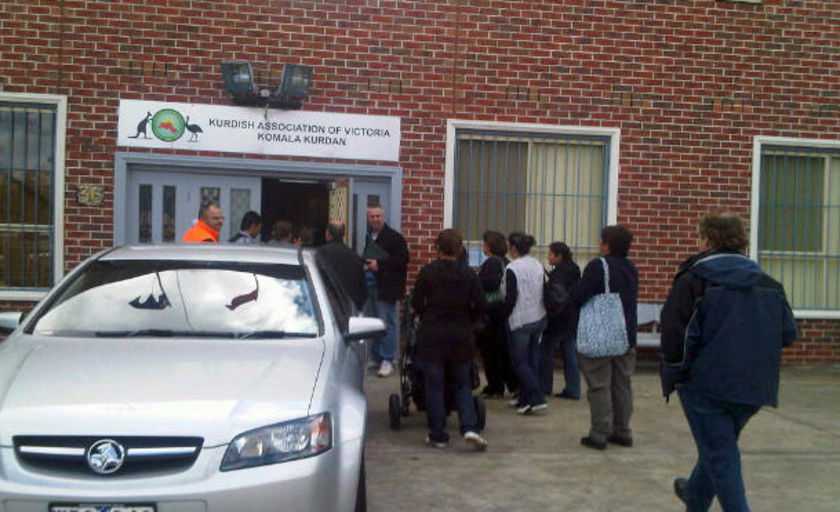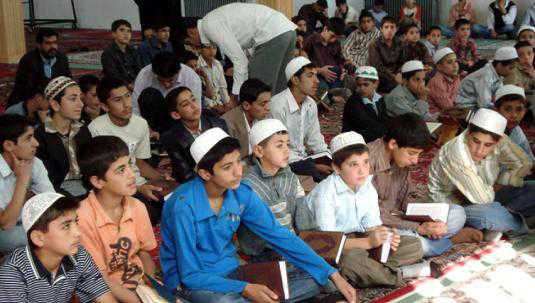People carry the coffins of victims as thousands of mourners gathered in Gulyazi village at the border with Iraq, southeast Turkey, Friday, Dec. 30, 2011 for the funerals of 35 Kurdish civilians who were killed in a botched raid by Turkish military jets that mistook the group for Kurdish rebels based in Iraq. Turkish television footage showed people, many weeping and lamenting the dead, as they gathered after the air strikes Wednesday that killed a group of smugglers along the border, one of the deadliest episodes in the conflic
Tag: Kurdish Hizbullah
-

Turkish Jets Hit Suspected Rebel Targets in Iraq
ANKARA, Turkey (AP) — Turkish warplanes have bombed suspected Kurdish rebel targets in northern Iraq, the military said Sunday — its second cross-border airstrike in just over a week.The jets hit caves and other rebel shelters in Iraq’s Zap and Hakurk regions, near the border with Turkey, in an operation that began late Saturday, a military statement said.All planes returned to base safely after the “effective” operation, the military said, but it did not provide any details about casualties or damage caused to the rebels of the Kurdistan Workers’ Party, or PKK, which is fighting for autonomy in Turkey’s largely Kurdish southeast.In Iraq, a PKK spokesman told The Associated Press that the warplanes started striking the border area at midnight and that four villages in the area were also exposed to artillery shelling.Bahtiyar Dogan said areas targeted were “farms, villages and old bases, which are not used by the PKK any more,” adding that there were no casualties among PKK fighters or the villagers.Dogan said the airstrikes were in response to a recent PKK attack that allegedly resulted in dozens of Turkish military casualties.It was not clear if Dogan was referring to clashes near the Turkish border town of Cukurca on Feb. 9, during which Turkish officials said one soldier was killed and six others were wounded. Turkish authorities also said troops killed four rebels in that clash.The PKK has long used northern Iraq as a base for hit-and-run attacks inside Turkey. The conflict that has killed tens of thousands of people since 1984. The group is labeled a terrorist organization by the European Union and the U.S., which has supplied Predator drones to Turkey to assist its fight.Turkey’s air force has launched dozens of raids on suspected rebel bases in northern Iraq since August, the latest on Feb. 3 when its jets hit suspected rebel hideouts near the Turkish border. No casualties were reported.In December, jets killed 34 smugglers they apparently mistook for rebels in a botched operation near the border with Iraq. It was one of the largest one-day civilian death tolls during Turkey’s 27-year drive against the rebels.___Yahya Barzanji in Sulaimaniyah, Iraq, contributed to this report. -

Serbia to send member of Kurdish Hezbollah to Turkey
Source: Tanjug
BELGRADE — Interior Minister Ivica Dačić says a member of the Kurdish Hezbollah, arrested yesterday, will be sent to Turkey if that country requests his extradition.

Serbian MUP officers are seen with Tamak after his arrest (Tanjug) Serbian MUP officers are seen with Tamak after his arrest (Tanjug)
Ajdan Tamak was arrested while he was hiding in a truck at the Horgoš border crossing between Serbia and Hungary.
He is currently held by the border police, it was revealed.
Dačić said that the Turkish Interpol stated that Tamak was sentenced to life in prison “for committing several terrorist acts”, and that he was wanted on charges of being a member of “the terrorist group (known as) Turkish or Kurdish Hezbollah”.
The Serbian police arrested Tamak and another person as they were trying to illegally cross the border and leave Serbia early on Friday.
According to reports, Interpol offices in Serbia and Turkey collaborated in this case.
via B92 – News – Serbia to send member of Kurdish Hezbollah to Turkey.
-

A Kurdish Rebel Softens His Tone for Skeptical Ears
Saturday, January 01, 2011

A Kurdish Rebel Softens His Tone for Skeptical Ears“We want the Kurdish problem — as a nation’s problem, as a people’s problem — to be solved not by guns, but by dialogue.”
MURAT KARAYILAN
By STEVEN LEE MYERS
Published: December 31, 2010Stephen Farrell and Namo Abdulla contributed reporting from Qandil, Iraq, and Sebnem Arsu from Istanbul.
QANDIL, Iraq
HIGH in the craggy mountains of Iraq’s northern frontier, where men (and, in this case, women) with guns have long operated beyond the control of any government, Murat Karayilan sounds more interested in pursuing peace than the war he has led against Turkey.
“We are not weak,” Mr. Karayilan said in an interview in this village, where he and other fighters of the Kurdistan Workers’ Party, or the P.K.K., represent the law of the land, despite official claims to the contrary.
“Our youths are always ready, hot-blooded and combative, but we want the Kurdish problem — as a nation’s problem, as a people’s problem — to be solved not by guns, but by dialogue.”
Many will doubt Mr. Karayilan’s sincerity, especially in Turkey. The party’s violent struggle has lasted more than a quarter-century and cost 40,000 lives. But now, perhaps more than ever before, there are indications that the war may have reached its endgame.
And that has put Mr. Karayilan — either a noble insurgent fighting oppression or a narco-terrorist commander — at the center of a different kind of offensive.
He has been making the case for Kurdish rights in Turkey in surreptitiously arranged, if not exactly clandestine, interviews from his mountainous redoubt, irritating officials on both sides of the border who would rather see him fade into obscurity.
“The Kurdish people are an ancient people in the world,” he said. “All their national and linguistic rights have been denied. Our goal is to achieve those rights.”
Mr. Karayilan’s party, long designated a terrorist organization and since last year a drug trafficker by the United States, has declared a new cease-fire and already extended it into the new year. Whether by design or under duress, the party has reduced its own political demands, tempered by the profound political and economic changes that have swept Turkey and Iraq.
Mr. Karayilan no longer calls for a separate Kurdish state, but for a degree of autonomy within Turkey that is inspired by, but stops considerably short of, the federal system the Kurds set up for themselves in Iraq after the American invasion in 2003.
Iraq’s Kurdish leaders, eager to expand trade and cross-border cooperation, have supported efforts to end the fighting, offering their own model of self-determination and rising prosperity as an example. Even as officials in Turkey rule out negotiations with the party itself, intermediaries have held secret talks to discuss the possibility of a lasting peace, according to officials in Iraq and Turkey.
The presence of the P.K.K. has long been an irritant in relations, prompting cross-border raids and bombings as recently as last summer. Increasingly, though, it would seem to be a surmountable one.
“We continue to remind all: Violence will not be the way to solve this issue,” said Barham Salih, the prime minister of the Kurdish regional government in northern Iraq.
Iraq’s Kurds are “mindful of our relationship with Turkey,” Mr. Salih added. The experience of the Kurds within Iraq’s democratizing if not yet fully democratic system “dispels the notion that the Kurds are a destabilizing element in this part of the world,” he said.
“We don’t have to be stuck in the conflicts in the past,” he said.
MR. KARAYILAN is a garrulous man, portly but fit, mustachioed and nattily dressed in the handmade olive-gray uniform that the party’s fighters wear. His past is murky enough that the United States Treasury Department’s official terrorist designations give two birth dates for him, making him either 56 or 60.
He has been the day-to-day commander of the Kurdistan Workers’ Party since its charismatic founder, Abdullah Ocalan, was captured in 1999, tried and sent to an island prison in the Sea of Marmara.
The leadership moved to Qandil shortly afterward, and its fighters live more or less openly in what amounts to an undeclared haven. Its fighters — a large number of them women — adhere to a disciplined, ascetic lifestyle. While they have always used the mountains as refuge, the toppling of Saddam Hussein has made this much easier — to the chagrin of the Turkish government, which routinely complains to the United States and Iraq to do more to curtail the P.K.K.’s movements.
“For the first time in history, the Kurds have breathing space,” said the movement’s spokesman, Roj Welat.
Mr. Karayilan’s exact base is, of course, kept secret, but the party’s presence in the gorges around Qandil is not. Uniformed fighters maintain a checkpoint on the road from the Kurdish regional capital, Erbil, not far beyond the last official checkpoint.
The party’s flag flutters over its territory, while Mr. Ocalan’s portrait hangs ubiquitously. Mr. Ocalan remains the movement’s revered leader, but he “is not in a position to giver orders” from prison, as Mr. Karayilan put it, though his messages and writings are still circulated.
The party runs a clinic with a German doctor and a factory to make the uniforms. It neatly tends a cemetery with a 30-foot white obelisk that looms over the graves of Kurdish fighters from Iraq, Turkey, Iran and Syria.
Mr. Karayilan said donations from Kurds in their homeland or abroad sustained the movement. American and Turkish officials say smuggling does. As for weapons, Mr. Karayilan smiled coyly when asked. “You can get whatever you want,” he said. “It’s the Middle East.”
The party unilaterally declared a cease-fire after an eruption in cross-border violence from 2007 to 2009. The lull has largely coincided with concessions from the Turkish government under Prime Minister Recep Tayyip Erdogan to expand rights for the country’s Kurdish minority by, for example, allowing a Kurdish-language television station and Kurdish-language studies at universities.
Mr. Erdogan’s government has ignored the party’s announced terms for an end to violence altogether, including the release of arrested Kurdish political activists and the creation of a reconciliation commission like the one in post-apartheid South Africa. Instead the government has struck a more nationalistic tone before elections in June. Nevertheless, the government is expected to offer some new gestures for Kurds in hopes of marginalizing Mr. Karayilan’s group.
“Some of the things listed as preconditions are already part of the democratic standards by our government for all of our citizens, not only for Kurds,” said Omer Celik, a member of Parliament and one of Mr. Erdogan’s leading political advisers.
Mr. Karayilan said the Turkish government lacked the political will to pursue a true peace, though, tellingly, he did not close the door on a negotiated resolution.
He spoke for nearly two hours in a cinder-block house here in Qandil, not far from another house badly damaged by two Turkish bombs in the summer.
He traveled with only a small retinue of guards in Toyota Land Cruisers and took few other precautions. When the interview ended, he apologized for not being able to stay for dinner.
For all his polite charm, he remains strident at times, denouncing what he called Turkish occupation, oppression and genocide. But the outline of an accommodation that he sketches no longer seems so far-fetched.
He urged the United States, as well as other nations, to stop seeing the conflict through the prism of the “war on terror,” but rather through that of self-determination. “It is the cause of a nation that needs to be addressed,” he said.
-

The Army Navy Game –
On Dec 20, 2010

Here’s a ‘today’ Yule story that occurred 3 weeks ago ~ AND NOW, in time for the holidays, I bring you the best Christmas story you never heard.
1.
It started last Christmas, when Bennett and Vivian Levin were overwhelmed by sadness while listening to radio reports of injured American troops. “We have to let them know we care,” Vivian told Bennett. So they organized a trip to bring soldiers from Walter Reed Army Medical Center and Bethesda Naval Hospital to the annual Army-Navy football game in Philly, on Dec. 3.
The cool part is, they created their own train line to do it. Yes, there are people in this country who actually own real trains. Bennett Levin – native Philly guy, self-made millionaire and irascible former L&I commish – is one of them.
He has three luxury rail cars. Think mahogany paneling, plush seating and white-linen dining areas. He also has two locomotives, which he stores at his Juniata Park train yard. One car, the elegant Pennsylvania , carried John F. Kennedy to the Army-Navy game in 1961 and ’62. Later, it carried his brother Bobby’s body to D. C. for burial. “That’s a lot of history for one car,” says Bennett.
He and Vivian wanted to revive a tradition that endured from 1936 to 1975, during which trains carried Army-Navy spectators from around the country directly to the stadium where the annual game is played. The Levins could think of no better passengers to reinstate the ceremonial ride than the wounded men and women recovering at Walter Reed in D. C. and Bethesda , in Maryland . “We wanted to give them a first-class experience,” says Bennett. “Gourmet meals on board, private transportation from the train to the stadium, perfect seats – real hero treatment.”
Through the Army War College Foundation, of which he is a trustee, Bennett met with Walter Reed’s commanding general, who loved the idea. But Bennett had some ground rules first, all designed to keep the focus on the troops alone:
No press on the trip, lest the soldiers’ day of pampering devolve into a media circus.
No politicians either, because, says Bennett, “I didn’t want some idiot making this trip into a campaign photo op”
And no Pentagon suits on board, otherwise the soldiers would be too busy saluting superiors to relax.
The general agreed to the conditions, and Bennett realized he had a problem on his hands. “I had to actually make this thing happen,” he laughs.
Over the next months, he recruited owners of 15 other sumptuous rail cars from around the country – these people tend to know each other – into lending their vehicles for the day. The name of their temporary train? The Liberty Limited.
Amtrak volunteered to transport the cars to D. C. – where they’d be coupled together for the round-trip ride to Philly – then back to their owners later.
Conrail offered to service the Liberty while it was in Philly. And SEPTA drivers would bus the disabled soldiers 200 yards from the train to Lincoln Financial Field, for the game.
A benefactor from the War College ponied up 100 seats to the game – on the 50-yard line – and lunch in a hospitality suite.
And corporate donors filled, for free and without asking for publicity, goodie bags for attendees:
From Woolrich, stadium blankets. From Wal-Mart, digital cameras. From Nikon, field glasses. From GEAR, down jackets.
There was booty not just for the soldiers, but for their guests, too, since eachwas allowed to bring a friend or family member.
The Marines, though, declined the offer. “They voted not to take guests with them, so they could take more Marines,” says Levin, choking up at the memory.
Bennett’s an emotional guy, so he was worried about how he’d react to meeting the 88 troops and guests at D. C.’s Union Station, where the trip originated. Some GIs were missing limbs. Others were wheelchair-bound or accompanied by medical personnel for the day. “They made it easy to be with them,” he says. “They were all smiles on the ride to Philly. Not an ounce of self-pity from any of them. They’re so full of life and determination.”
At the stadium, the troops reveled in the game, recalls Bennett. Not even Army’s lopsided loss to Navy could deflate the group’s rollicking mood.
Afterward, it was back to the train and yet another gourmet meal – heroes get hungry, says Levin – before returning to Walter Reed and Bethesda . “The day was spectacular,” says Levin. “It was all about these kids. It was awesome to be part of it.”
The most poignant moment for the Levins was when 11 Marines hugged them goodbye, then sang them the Marine Hymn on the platform at Union Station.
“One of the guys was blind, but he said, ‘I can’t see you, but man, you must be beautiful!’ ” says Bennett. “I got a lump so big in my throat, I couldn’t even answer him.”
It’s been three weeks, but the Levins and their guests are still feeling the day’s love. “My Christmas came early,” says Levin, who is Jewish and who loves the Christmas season. “I can’t describe the feeling in the air.” Maybe it was hope.
As one guest wrote in a thank-you note to Bennett and Vivian, “The fond memories generated last Saturday will sustain us all – whatever the future may bring.”
God bless the Levins.
And bless the troops, every one. -

Terror raids across Melbourne
Paul Millar
 Anti-terrorism raids on homes across Melbourne this morning were part of a national effort, with properties in Sydney and Perth also targeted.
Anti-terrorism raids on homes across Melbourne this morning were part of a national effort, with properties in Sydney and Perth also targeted.In a joint blitz, police executed a number of search warrants as part of their investigation into organisations funding overseas terrorists.
The counter-terrorism teams include the Australian Federal Police, and officers from New South Wales, Victoria and Western Australia.
The raids are part of an investigation into the funding of terrorist organisations.
“The community can be assured that this investigation is not related to any terrorist-related threat or incident,” a police spokeswoman said.
The Melbourne raids took place in Glenroy, Coolaroo, Pascoe Vale, and Dandenong.
Police raided the offices of the Kurdish Association of Victoria on Fawkner Road, Pascoe Vale, before dawn.
They sealed off the area and entered the offices.
Police seized boxes full of documents in the raids.
They also took desktop computers, hard drives and bagged evidence to waiting police cars.
Local Kurds, however, said the raids were nothing more than a political stunt.
Sniffer dogs combed the scene and association members were barred from entering the property.
Up to seven police cars were at the scene at first light.
The raids are believed to be linked to Kurdish groups providing funding to terror organisations overseas.
The Kurdish Association of Victoria was established to help newly arrived Kurdish refugees and migrants.
Its website says it provides a range of services for the Kurdish community, including settlement, advocacy, referral, education and health issues.
It also offers cultural and recreational programs in the areas of folk dancing, traditional music and Kurdish language.
The raids are believed to be linked to a crackdown on funding for the Kurdish Workers’ Party, which is listed as a terror organisation internationally. The PKK’s goal is to establish an independent Kurdish state.
with Reid Sexton
, 19 August 2010

-

Iran’s Kurdish Region Turns to Al-Qaeda Recruitment Place

Kurdish Children are taught Quran in a Sunni Mosque in Urmia, a Kurdish city of Iran.---------- Photo by Rudaw By AZAD KURDI
ERBIL, Iraqi Kurdistan: Not long ago, three 19-year old boys left Iran’s Kurdish region to Afghanistan to join al-Qaeda. In the mid of last month, it was reported that they had been killed by the American and coalition forces.
The dead fighters were Kurds from the city of Saqiz where majority of the people are Sunni Kurds, poverty and unemployment on the rise.
Here in this city and other Kurdish towns of Iran, residents point to an increasing number of extremist Salafi groups spreading Jihadist ideologies and swaying beliefs of dozens of adults.
Many Kurds warned that the region was increasingly becoming a place to recruit fighters for al-Qaeda.
Iran’s Kurds are subjected to a doubled-discrimination. Firstly they are discriminated for being Kurds not Persians and second they for being Sunnis not Shiites.
Right after the disappearance of their sons, the parents of the three dead fighters started to file lawsuits against a number of Mullahs preaching extremism and anti-Western ideas.
Rudaw found out that none of the Mullahs had been arrested by the Shiite-led government.
Kurdish youths fighting against American and Western forces in Afghanistan and Iraq is not a new thing. Last year, Suleiman Ahmadi, Iranian Kurds, was found killed in Afghanistan.
Experts see the rise of unemployment, using drugs, poverty in the region as main reasons why the adults join al-Qaeda.
“All of these play roles in strengthening the groups,” said Khalid Tawakwli, Iranian Kurdish sociologist.
Before 2003, in the Iraqi Kurdish mountains of Hawraman bordering Iran, there was a Kurdish offshoot of al-Qaeda under the name of “Ansar al-Islam.”
Their bases were bombed by the American missiles at the outbreak of the Iraq war, many members killed and the rest fled to Iran, south and center of Iraq and abroad.
The leader of the group, Mullah Krekar, is now based in Norway. It is not clear whether any of the former Ansar al-Islam members is working in the current Iranian-based groups.
But a senior member of a pro-Kurdish Iranian opposition party, Aram Mudaris, was convinced that many of the senior members of the Iranian extremist groups had been ex-members of Ansar al-Islam fled to Iran after the US-bombardment.
“Those groups are logistically and financially supported by the Iranian regime” said Mudaris, senior leader of Komala party.
He said that the groups have mainly relied on using mosques to practice their political work and convene with their members since the 2003 US-led invasion.
Some other experts say that Iran’s toleration of these groups is to kill two birds with one stone.
The first goal is domestic, that is, undermining Kurdish nationalism. The second one is to use the groups to weaken U.S. counter insurgency strategy in Afghanistan and Iraq.
, 11/08/2010
